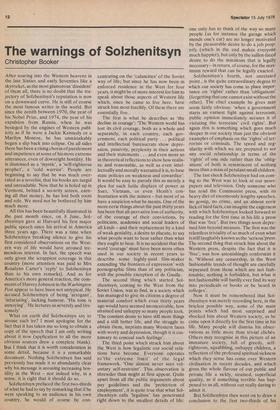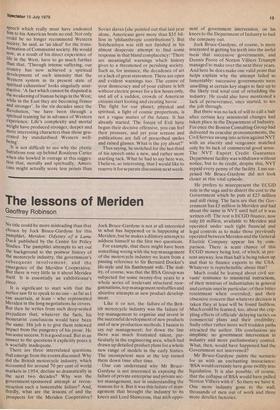The warnings of Solzhenitsyn
Christopher Booker
After soaring into the Western heavens in the late Sixties and early Seventies like a skyrocket, as the most glamorous 'dissident' of them all, there is no doubt that the trajectory of Solzhenitsyn's reputation is now on a downward curve. He is still of course the most famous writer in the world. But since the zenith between 1970, the year of his Nobel Prize, and 1974, the year of his expulsion from Russia, when he was besieged by the engines of Western publicity as if he were a Jackie Kennedy or a Marilyn Monroe, he has unmistakably begun a slip back into eclipse. On all sides there has been a rising c horus of puzzlement and impatience at some of his more extreme utterances, even of downright hostility. He is dismissed as a 'mystic', a 'self-righteous prophet', a 'cold warrior'. People are beginning to say that he was much overrated as a novelist, that his books are turgid and unreadable. Now that he is holed up in Vermont, behind a security screen, earning all that money, he has lost both roots and role. We need not be bothered by him much more.
All this has been beautifully illustrated in the past month since, on 8 June, Solzhenitsyn gave at Harvard his first major public speech since his arrival in America three years ago. There was a time when Solzhenitsyn breaking silence to give his first considered observations on the Western way of life would have aroused tremendous interest. In fact, the speech was only given the scrappiest coverage in this country (more attention was paid to Mrs Rosalynn Carter's 'reply' to Solzhenitsyn than to his own remarks). And as for America's more general reaction, the cornments of H arvey Johnson in the Washington Post appear to have been not untypical. He accused Solzhenitsyn of being 'arrogant', 'infuriating', lacking humour. 'His tone is annoying'. 'He lectures us severely and tiresomely'.
What on earth did Solzhenitsyn say to arouse such ire? I must apologise for the fact that it has taken me so long to obtain a copy of the speech that I am only writing about it now (application to all the more obvious sources drew a complete blank). But I think that it is worth consideration in some detail, because it is a remarkable document. Nothing Solzhenitsyn has said previously has made it so abundantly clear why his message is arousing increasing hostility in the West — nor indeed why, in a sense, it is right that it should do so.
Solzhenitsyn prefaced the first two-thirds of what he had to say by remarking that if he were speaking to an audience in his own country, he would of course be con
centrating on the 'calamities' of the Soviet way of life; but since he has now been in enforced residence in the West for four years, it might be of more interest for him to speak about those aspects of Western life which, since he came to live here, have struck him most forcibly. Of these there are essentially five.
The first is what he describes as 'the decline in courage': The Western world has lost its civil courage, both as a whole and separately, in each country, each government, each political party . . . political and intellectual bureaucrats show depression, passivity, perplexity in their actions and their statements . . . and even more so in theoretical reflections to show how realistic and reasonable, as well as even intellectually and morally warranted it is, to base state policies on weakness and cowardice'. It would be easy to parody this as merely a plea for such futile displays of power as Suez, Vietnam, or even Heath's confrontation with the miners — but most of us have a suspicion what he means. One of the more eerie things about the past thirty years has been that all-pervasive loss of authority, of the courage of their convictions, by politicians, academics and social leaders of all kinds — and their replacement by a kind of weak geniality, a desire to placate, to say what people want to hear rather than what they ought to hear. It is no accident that the word 'courage' must have been more often used in our society in recent years to describe some highly-paid film-maker extending 'the frontiers of expression' with pornographic films than of any politician, with the possible exception of de Gaulle.
The second thing which started Solzhenitsyn, coming to the West from the Soviet Union, was to find, in a society which has managed to give its citizens a degree of material comfort which even thirty years ago would have seemed inconceivable, how strained and unhappy so many people look. The constant desire to have still more things and a still better life, and the struggle to obtain them, imprints many Western faces with worry and depression, though it is customary to conceal such feelings'.
The third point which struck him about the West is how legalistic our social relations have become. Everyone operates to 'the extreme limit' of the legal framework. 'One almost never sees voluntary self-restraint'. This observation is shrewder than might at first appear. Quite apart from all the public arguments about pay guidelines and the 'protection of employment', it is quite true that what Solzhenitsyn calls 'legalism' has penetrated right down to the smallest details of life:
one only has to think of the way so many people (as for instance the garage which mends one's car) are no longer motivated by the pleasurable desire to do a job properly. (which in the end makes everyone much happier), but only by the sullen-faced desire to do the minimum that is legally necessary — in return, of course, for the maximum reward that can be legally exacted.
Solzhenitsyn's fourth, not unrelated point, is the quite extraordinary degree to which our society has come to place importance on 'rights' rather than 'obligations' (forgetting that one cannot exist without the other). The chief example he gives may seem fairly obvious: 'when a government starts an earnest fight against terrorism, public opinion immediately accuses it of violating the terrorists' civil rights'. But again this is something which goes much deeper in our society than just the obvious examples of emphasis on the 'rights' of terrorists or criminals. The speed and regularity with which we are prepared to see any social relationship in terms of the 'rights' of one side rather than the 'obligations' of both is reminiscent of nothing more than a mass of petulant small children.
The last shock Solzhenitsyn had on coming to the West was to look at our newspapers and television. Only someone who has read the Communist press, with its heavy diet of enormously lengthy speeches, no gossip, no crime, and an almost eerie lack of hard facts, can imagine the eagerness with which Solzhenitsyn looked forward to reading for the first time in his life a press that was 'free'. But two things soon depressed him beyond measure. The first was the relentless triviality of so much of even what is still laughably known as the `serious'press. The second thing that struck him about the Western press, despite the fact that it is 'free', was how astonishingly conformist it is. 'Without any censorship, in the West fashionable trends of thought are carefully separated from those which are not fashionable; nothing is forbidden, but what is not fashionable will hardly ever find its way into periodicals or books or be heard in colleges'.
Now it must be remembered that Solzhenitsyn was merely recording here, in the briefest possible way, some of the main points which had most surprised and shocked him about Western society, as he came upon it directly for the first time in his life. Many people will dismiss his observations as little more than trivial clichés. Others may recognise in this picture of an immature society, full of greedy, selfrighteous, squabbling, unhappy children, a reflection of the profound spiritual sickness which they sense has come over Western civilisation in recent decades, and which gives the whole flavour of our public and private life a sickly, strained, superficial quality, as if something terrible has happened to us all, without our really daring to admit it.
But Solzhenitsyn then went on to draw a conclusion to the first two-thirds of his Speech which really must have endeared him to his American hosts no end. Not only could he no longer recommend Western society, he said, as 'an ideal' for the transformation of Communist society. He would now, as a result of his direct experience of life in the West, have to go much further than that. 'Through intense suffering, our
count iy has now achieved a spiritual
development of such intensity that the Western system in its present state of Spiritual exhaustion' looks singularly unattractive. 'A fact which cannot be disputed is the weakening of human beings in the West, While in the East they are becoming firmer and stronger'. In the six decades since the Revolution, 'we have been through a Spiritual training far in advance of Western experience. Life's complexity and mortal weight have produced stronger, deeper and more interesting characters than those generated by standardised Western wellbeing'.
It is not difficult to see why the plastic battalions rose up behind Rosalynn Carter When she howled in outrage at this suggestion that, morally and spiritually, Americans might actually score less points than Soviet slaves (she pointed out that last year alone, Americans gave more than $35 billion in 'philanthropic contributions'). But Solzhenitsyn was still not finished in his almost desperate attempt to find some response in that bland complacency: 'There are meaningful warnings which history gives to a threatened or perishing society. Such as, for instance, the decadence of art or a lack of great statesmen. There are open and evident warnings too. The centre of your democracy and of your culture is left without electric power for a few hours only, and all of a sudden, crowds of American citizens start looting and creating havoc. . . The fight for our planet, physical and spiritual, a fight of cosmic proportions, is not a vague matter of the future. It has already started. The forces of Evil have begun their decisive offensive, you can feel their pressure, and yet your screens and publications are full of prescribed smiles and raised glasses. What is the joy about?'
Thus saying, he switched for the last third of his speech onto a new, and rather more startling tack. What he had to say here was, I believe, so interesting, that I would like to reserve it for separate discussion next week.



































 Previous page
Previous page